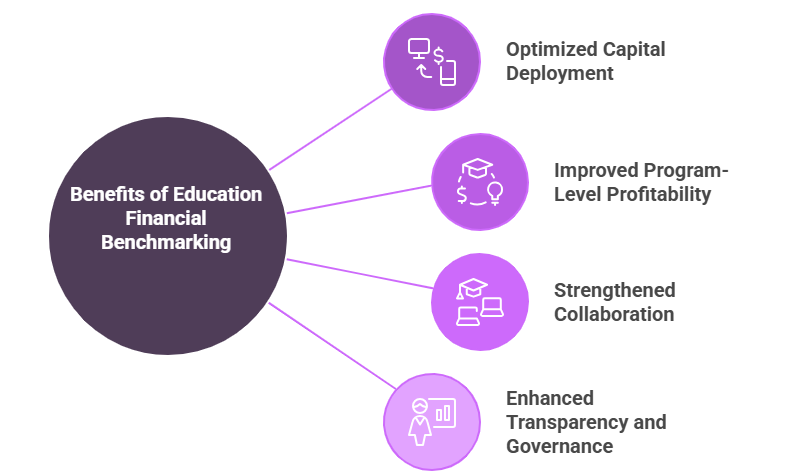The education landscape is evolving rapidly, with hybrid learning models emerging as the new normal. Institutions are investing heavily in digital platforms, learning management systems (LMS), online content, and campus modernization to deliver seamless, tech-enabled learning experiences.
However, this dual operating model comes with growing financial complexity. Institutions often face challenges in determining whether their hybrid investments are driving the right balance between academic excellence and fiscal efficiency. Are digital programs improving margins? Is capital being effectively allocated across online and offline infrastructure? And what is the measurable return on academic investment (ROI) from these hybrid programs?
This is where Financial Benchmarking Consulting becomes essential. By comparing parameters such as cost per enrolled learner, capital deployment across channels, faculty utilization, and program profitability, benchmarking provides visibility into how efficiently educational resources are being used and how the institution performs against peers.
Nexdigm’s Financial Benchmarking Framework for Hybrid Education Models
At Nexdigm, we recognize that the success of hybrid education depends on balancing academic delivery with financial intelligence. Our Financial Benchmarking Framework for Hybrid Learning Models enables institutions to assess the effectiveness of their financial strategies, optimize capital utilization, and measure the true ROI of academic initiatives across digital and physical ecosystems.
Stage 1: Peer and Institutional Mapping
We begin by identifying comparable hybrid institutions, private universities, and EdTech-enabled academies operating under similar enrollment scales, digital maturity, and revenue models. This ensures benchmarking insights are relevant, actionable, and aligned with sector realities.
Stage 2: Financial and Operational KPI Benchmarking
Nexdigm benchmarks core indicators such as cost per enrolled learner, revenue per faculty member, operating expense ratio, and program-level profitability. This helps institutions compare their hybrid efficiency and academic ROI against peers in both local and global markets.
Stage 3: Capital Allocation and Cost Efficiency Analysis
We analyze how institutions distribute capital between campus infrastructure, digital systems, content development, and student acquisition. Our evaluation reveals where capital intensity exceeds performance and where cost reallocation could drive stronger margins and academic impact.
Stage 4: Academic ROI and Program-Level Profitability Modeling
Through detailed ROI modeling, Nexdigm quantifies the financial return of academic programs factoring in tuition revenue, operational cost, digital adoption, and student outcomes. This enables institutions to identify their most profitable programs and replicate success across other verticals.
Stage 5: Strategic Dashboard and Performance Insights
All insights are consolidated into a Hybrid Education Financial Benchmarking Dashboard, providing leadership with a real-time view of cost structures, efficiency gaps, and ROI drivers. The dashboard supports continuous improvement and enables transparent, data-backed communication with boards, investors, and regulatory bodies.
Nexdigm’s framework transforms hybrid education from a dual delivery model into a financially optimized, strategically scalable education ecosystem.
Strategic Benefits for Educational Institutions and EdTech Collaborators
Financial benchmarking provides hybrid learning ecosystems with a strategic compass, helping academic leaders and EdTech partners translate dual-delivery operations into measurable financial and academic outcomes. By establishing clarity around costs, efficiency, and ROI, institutions can make informed capital decisions that sustain both innovation and educational excellence.

- Optimized Capital Deployment: Benchmarking reveals how effectively funds are allocated across digital platforms, infrastructure, content creation, and faculty resources. It identifies underperforming cost centers and guides reallocation toward initiatives with stronger academic impact and financial returns.
- Improved Program-Level Profitability: Through financial and performance comparisons, institutions can determine which courses, degree programs, or online modules yield the highest ROI per learner. This insight supports scalable program design and informed expansion strategies.
- Strengthened Collaboration Between Institutions and EdTech Partners: Benchmarking promotes alignment between educational institutions and their EdTech collaborators by defining clear financial expectations and accountability metrics. It ensures that technology partnerships are delivering quantifiable value and shared efficiency gains.
- Enhanced Financial Transparency and Governance: With standardized benchmarks, leadership teams gain transparency across hybrid operations, enabling data-backed decision-making for boards, investors, and accrediting bodies. Benchmarking also reinforces fiscal responsibility while supporting compliance and sustainability objectives.
Nexdigm’s Financial Benchmarking Consulting Services for Hybrid Education Models help academic institutions, universities, and EdTech collaborators transform data into actionable financial insights.
To take the next step, simply visit our Request a Consultation page and share your requirements with us.
Harsh Mittal
+91-8422857704

